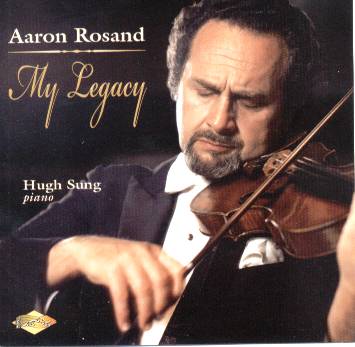Rosand’s Legacy, as one can determine from the programme
he essays, is Polish. To this a little greater spice is added because
he plays the ex-Kochanski Guarneri; Szymanowski’s Three Myths were dedicated
to that magnificent but sadly short-lived violinist. Recorded in May
2001 Rosand shows few signs of technical decline and none at all of
a loss of expressive nuance. Part of something of a Golden Age of American
violinists – in an era in which Isaac Stern ruled the roost domestically
– Rosand has recorded for a number of smaller labels and the latest
is Artek. He is a marvellous musician and as he showed during his last
London visit, when I heard him at the Wigmore Hall, his ability to coax
a sweet yet powerful tone is unimpeded, his slides still apposite and
tastefully deployed, his whole artistic persona one of generous engagement
- one of the very best violinists of his generation.
He catches the soaringly fractured line in Szymanowski’s
Nocturne, its folk impulses perfectly understood and in the Tarantella
he is effortlessly virtuosic, a suitably dramatic orator; my only complaint
is that the balance favours the excellent pianist Hugh Sung, a splendidly
active musician but here one who can submerge the violin. The phantasmagoric
intensity of the Fountain of Arethusa is treated to Rosand’s
special poetic intensity and luscious deployment of expressive devices.
His intonation remains under control, his playing one of optimum poeticism.
In Narcissus he seems to inhabit its rapturous introversion -
intoxicating – and he flutters and skitters, running through daredevil
heroics in Dryads and Pan. But he is just as capable of catching
the essence, the core of the hallucinatory, otherworldly syntax even
down to the puckish, throwaway spectral finish. Rosand lavishes the
full range of his bewitching tone colours on the Op. 23 Romance
– very tender playing with superior and sophisticated finger position
changes.
He also plays a group of Chopin Nocturnes; two in nowadays
somewhat overlooked arrangements by August Wilhelmj, one by Sarasate
and one by Milstein (the familiar C sharp minor). I like the way he
points up the rather idiomatically solemn religiosity of the central
section of the E minor (in the Wilhelmj transcription). Perhaps he lacks
Milstein’s stillness in the C sharp minor but this is still a good performance.
In the Wieniawski group his Capriccio-Valse is not too fingerbustingly
motoric – it has colour, it has luscious tone, it has poise. The moto
perpetuo type Saltarelle (actually a Caprice) is in true nineteenth
century showstopper tradition – and Rosand doesn’t let us down – and
the recital ends with the more familiar Souvenir de Moscou. Here
is more evidence of the sheer elegance and precision of his playing.
The harmonics are negotiated with panache though the tempo is never
excessive.
My admiration for Rosand has lasted a long time and
is undimmed. His latest release continues in the tradition of his august
discographic predecessors. He is a violinist we will hear whatever he
plays.
Jonathan Woolf
